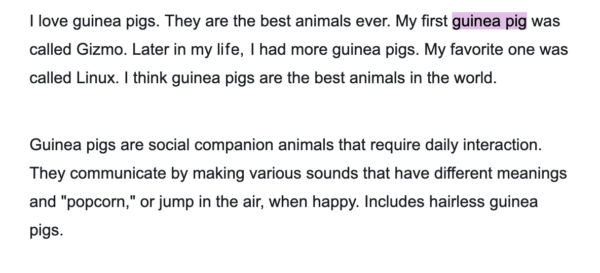How to write naturally beyond exact keyword matching

Exact keyword matching used to be an important SEO tactic, but those days are long gone. Now search engines can understand when similar phrases and related terms mean the same thing. Adding too many exact match keywords might make Google think your post is just another piece of spam. We’ll explain how to write naturally while still using your keywords. You’ll be seeing green bullets in no time!
As we mentioned in the introduction, focusing on just exact keyword matching isn’t really necessary anymore. It can actually be harmful to your SEO by making your writing seem spammy. In fact, in Google’s helpful content update, they said they wanted to see: “helpful content written by people, for people”. This means that the quality of your content could have an even bigger impact on your rankings. So you should focus on creating content that’s written in a natural way, using a variety of related keywords and phrases. Automatically-generated content or content that’s spam-filled with keywords simply won’t work anymore.
What does writing naturally mean?
Using a natural writing style means that if someone reads your text aloud, it sounds like normal human speech. Think of the way it sounds when a friend, family member, or teacher explains something to you — that’s ‘natural’. In contrast, a legal document or a technical handbook is written in an ‘unnatural writing style’; very few (if any) people speak in that way.
A natural writing style has lots of benefits! It’s usually more comfortable for users to read, and it can be a lot more engaging. Many people find writing in a natural way easier, too. Think about it — reading a magazine article feels a lot more enjoyable than reading a set of terms and conditions. It feels like the author is talking to you, and you can get to know the person writing.
Natural writing and SEO
Let’s say you’re preparing for the holiday season. You want to optimize your site so people can find it, which is great! But thinking too much about keywords and calls to action can be a distraction. The result? Clunky, hard-to-read text with too many keywords or keyphrases squeezed in where they don’t belong. Unfortunately, those keyphrases aren’t likely to help your rankings much, and any user who does find your page in the search results probably won’t read your content.
Does that make it harder to optimize your text for search engines? Not at all! Especially if you use the Yoast Premium SEO analysis because this feature recognizes related keywords, synonyms and variations of your keyphrase as well. It allows you to write high-quality content for your visitors and much more natural-sounding texts! Because when we speak naturally, we say the same thing in lots of different ways, too.
“Yoast SEO only recognizes my exact focus keyphrase”
So, what’s the difference between the Premium SEO analysis and the free version? Is it really worth getting the premium version to prepare your site for Black Friday (and other holidays)? While the free version of Yoast SEO is great for getting a general idea of how many times you mention your focus keyword, our premium plugin helps you write more naturally. You’ll get high-quality content and the best SEO results. Not convinced? Let’s look at an example.
Imagine this: You’re trying to optimize your post for the term [guinea pig]. In your text, you’ll probably use guinea pig (singular) and guinea pigs (plural). However, if your focus keyword is the singular [guinea pig], the keyword density check in the free version does not recognize your plurals and will give you a red traffic light.


The free version of Yoast SEO is great for getting a general idea of how many times you mention your focus keyword. But if you want to write naturally and get the best SEO results, our premium plugin can help.
How our premium analysis can help you
So, how does the analysis in Yoast SEO Premium help you to write more naturally? Firstly, in the premium analysis, plurals and past tense are recognized as occurrences of your focus keyword, so they’ll count towards your SEO assessment and will help you get those bullets green!
Let’s look at the example again. With our premium plugin, both guinea pig and guinea pigs are highlighted:

Besides allowing variants of your keyword, the premium analysis also lets you add related keywords and synonyms. For instance, instead of always using the keyphrase guinea pig, you can switch it up and refer to cavia or cavy, which is another name for the guinea pig. When you add cavy as a related keyphrase, you’ll get another SEO check for that phrase too.
Let’s look at another example: if your focus keyphrase is [playing with your cats], it will recognize that keyphrase in the sentence ‘You can use toy mice to play with your cat‘. Or, if you want to optimize for [games for cats] it will recognize the sentence, ‘Another game your cat will love …’ as well. The analysis is able to recognize these variations on your keyphrase and add them to your total usage of the focus keyphrase.
Yoast SEO Premium makes it easier than ever to write SEO-optimized texts in a natural way. And it gets even better — by using synonyms and related keyphrases, you increase your chances of ranking for different related queries in the search results too! Read more about this in our post about how to use synonyms and related keywords.
Focus on writing naturally
You want your visitors to find and love your content. And you want Google to love it too! In order to achieve both, you should focus more on writing naturally, which is the whole idea behind our premium analysis. No more awkwardly rewriting your sentences, so the SEO analysis picks up on your keyword. No more wondering if you really didn’t use your keyword often enough, or if the plugin simply doesn’t recognize every instance. Our plugin will give you little nudges to optimize your text a bit more, without tempting you to chase the green traffic lights with exact keyword matching. You’ll write quality content that users will enjoy reading!
Read more: The Yoast SEO Premium analysis »

